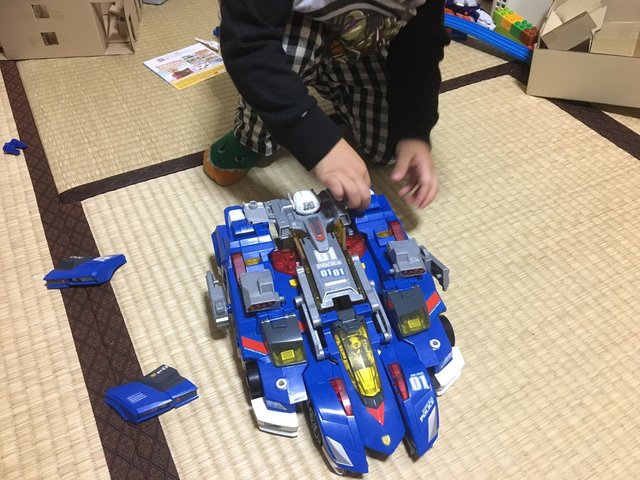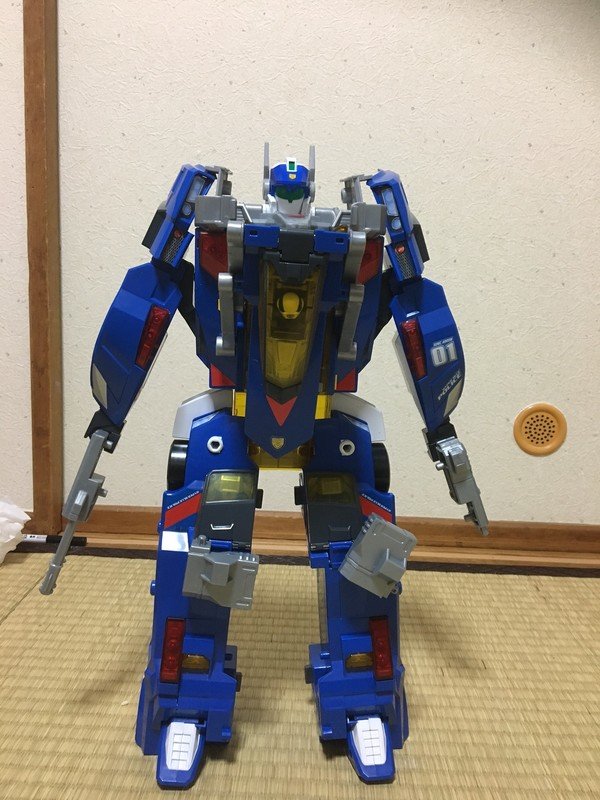Building a Robot Army: How Japanese Toys Provide Valuable Insight into the Myriad Potential of Blockchain Technology, and Life Itself.

The Open-Source Blockchain Called "Life"
Open source, blockchain programs and technologies are like reality. In reality, you can create whatever you choose to, develop your lifestyle, sense of self, skills, and abilities, and "plug in" to the reality of others as a "third party app." You can start clubs, organizations, and movements. You can cater to different peoples' interests. The possibilities are endless. You can smoke pot, be a Jesus freak, or jump off of a bridge to "end it all." Reality doesn't judge or discriminate, it is simply a platform. You are the creator.
But what if somebody jumped in and said:
Hey, wait a minute, bud! We own this. Forget smoking pot, we will kick you off of the reality blockchain. Liking Jesus is cool, but if you talk about it too much, we will put you on a "watch list." Thinking of killing yourself? It's a crime. We will call you a criminal and legally punish your family for your pain. This once was open source. A kind of real life Ethereum, if you will, but now we are in charge, and what we say goes.
Wouldn't it be fucked up if somebody did that to the decentralized, open source blockchain program called "reality?" Of course it would. And they already have. They're called "centralized government" or "the state."
On Japanese Toys
Today was my son's birthday. We bought him a two new Tomica brand Hyper Blue Police robot toys (these types of toys tend to dominate the market here in Japan for boys his age) and brought them home to check them out. What is amazing about these toys is that even across products, they all tend to lock together and supplement one another, sometimes even allowing four or five or more fully functional, as-is, independent toys to recombine and form not just one, but several new and unique products and expressions. This of course resulting in huge dividends for the company (kids gotta have the add-ons!) as well as endless fun for the kids who can keep buying, interlocking, and transforming their original toys to create vastly different final products. Here's an example of our fun today:

Toy 1

Toy 2

Combine them to make the "Victory Sonic."
But what does this have to do with blockchain technology?
As I was marveling at my son's new toy, something occurred to me: This is great. These toys are like the apps, programs and third-party plug-ins on the brand's "blockchain." They all have the potential to interlock. Even seemingly unrelated toys from the same maker (read blockchain) can connect and interact with this toy. It got me thinking about blockchain computing platforms like Ethereum.
Anyone can use the platform, create their own programs on the Ethereum blockchain, and execute smart contracts using the same. I could make my own altcoin, banking software, or anarchist cookbook. It doesn't matter. The platform doesn't care. Whatever it is that I create, if I create it well, it has the potential to interact with, supplement, and synergistically combine with any other application, even if seemingly unrelated, in a kind of digital symbiosis. Why is this possible? Because the shared underlying platform is broad, general, and decentralized. Just like life.
The bigger and more non-discriminatory the platform, the more apps, coins, smart contracts, social media, files, marketplaces, and organic systems of checks and balances can be accommodated, facilitated, and potentiated by it. The smaller and more exclusive and centralized the platform, the less it can do, and, in many ways, the more damage it can do.
Pitfalls of Centralization
Take PayPal, for instance. A centralized payment service. What happens if they "get hacked?" What happens if the PayPal crew decides to start scamming people, and taking their money? Sure, it may be unlikely in the current market climate, where the company is successful and stands to lose a lot if a scandal smears its reputation, but the point is that it can be infiltrated, and if it is, there is virtually nothing you can do about it.
Say the state barges in and wants to make some changes in the PayPal platform. How will you protect your assets should they decide to change protocol, or "adjust" your balance based on some new, arbitrary edict or political whim? You would have to depend on the state itself to bring justice in these instances of fraud, and those who are familiar with the ways of the state should receive little consolation from this.
PayPal is narrow. There are not thousands of nodes verifying and backing up transaction info that you can appeal to in the case of an accounting discrepancy. You're at the mercy of the centralized server (which you have no access to) and politicians. That's like playing Russian Roulette with 5 bullets in the gun. Some would argue it's more like playing with 6. I would argue that one should probably not play stupid games in the first place.
Here's a video demo of some of the other cool functionalities of the toy!
The Free Market
The market wants what it wants, and if it wants what I make, I may do well for myself. If I create some crappy program that sucks on the Ethereum platform, I will probably not do well for myself. If I try to implement malicious code, or pursue endeavors that harm others, I may be found out, and face repercussions. These things all happen naturally in markets. Surprisingly, the answer to addressing these negative actions made possible by the freedom of the market, is the market itself.
If I am a major dick, someone might make a program to weed out all the "major dicks" on the platform and publicly identify them so they can be "blacklisted." If this blacklisting software is designed well, voilà! The guy rooting out the malicious elements via his code is handsomely rewarded by those who deem his service valuable.
Now Back to Reality
Toy robots are awesome. Especially when they interlock and make each other better.
Reality is awesome. Especially when people are free to interact and do as they please in non-violence.
Open source, blockchain technology is a mirror of reality in the digital realm. It is, to use a cliché, the true "grave of the future." The grave of the old paradigm, and the birthplace of the new, soon to flourish tree of decentralization. Imagine millions of different companies, unrelated and independent, being able to work together directly without a middle man. Imagine trade without boundaries and, like the toy robots, imagine being able to program your own software which could integrate your devices, banking, social media, insurance, documents, contracts, businesses, and allow them to interact with other devices, services, and businesses all around the world, without having to appeal to monolithic centralized servers and entities to do so!
We should not tolerate obfuscation or obstruction in either instance. Whether it be putting a kid in jail for a plant in the "real world," and calling that "the law" (as if the words "the law" somehow equated with morality) or putting a guy in a cage in the real world for a non-violent service he provided in the binary one (see Ross Ulbricht)

Recombine the two cars and you've got this! The final incarnation. A total of four different toys from two purchases. As an interesting aside, my son also used the "open source engineering" of these toys to recombine and make his own version.
Bring in the Robots, Don't Mourn the Dinosaurs
The day of centralized, closed-source, coercion-based platforms (like the state and its "services") is over. Even non-coercive enterprises such as YouTube and Facebook that heavily censor their users are going to have to wake up soon. The old paradigm is a fucking T-Rex staring at the smoke-filled, hazy sky after the giant meteor called "blockchain" just put the finishing touches on the earth. If people have a choice, they will choose to have a choice. Decentralized blockchain tech makes that possible.
Of course, I should probably make it clear that I believe platforms and other private businesses that are not open source have a total, 100% right to censor and mess with your stuff within the confines of whatever voluntary agreements and contracts were made between their enterprise and you. They created the platforms as private enterprises. You voluntarily joined the platforms and chose to participate. If Mark Zuckerberg doesn't want you bashing Hillary Clinton because your friend "reported" you, too bad. It's a private enterprise. If PayPal decides you didn't ever pay that money they said you owed, even if you did, it's going to be your word against theirs in a "court of law" run by people who don't give a damn about you. That sucks, but so it goes.
The miracle of the blockchain is this: Someone creates it, makes it impossible for themself to ever re-enter and tamper with their own creation (imagine locking a lock and tossing away the key) and then sets that beautiful creation free, out into the world. That's pretty amazing.
~Kafka
Graham Smith is voluntaryist activist and blogger residing in Niigata, Japan.
Excellent post! Sounds like your son had a fun birthday, and whoever designed those toys is a genius for building in all those synergistic aspects. Synergies in decentralized applications that leverage smart contract platforms will become increasingly important for the evolution of the blockchain ecosystem as we go along. It's one way to build a network effect and help push crypto towards mainstream adoption. For example, the uPort identity management system being created by ConsenSys should be able to integrate with a number of different Ethereum apps, which by leveraging the uPort features won't have to constantly reinvent the wheel when it comes to online profiles & identity verification. Much like your son's toys (I love the analogy by the way), dapps can be interlocking building blocks that combine to present a greater whole than what can be achieved in isolation.
The ecosystem has quite a ways to go before it reaches maturity, but I expect the next few years will be quite exciting! Can't wait to see how it all turns out!
Wow. I didn't know about the uPort identity management system. That is very exciting. About the toys, yeah, I was telling my wife that these guys probably have engineering degrees. The amount of planning and thought that goes into the designs and the marketing campaigns is unbelievable. Thanks as always for the great comment.